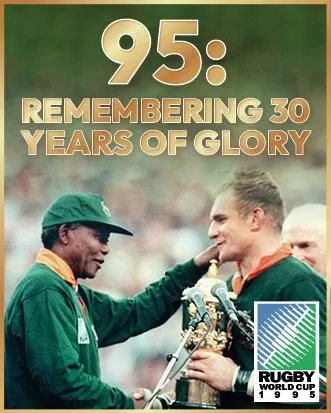Rugby World Cup 1995 | Canadians cause a riot against Springboks in Battle of Boet Erasmus II
Rugby World Cup 1995

The big winner of the Battle of Boet Erasmus at the Rugby World Cup 1995 between the Springboks and Canada, was Chester Williams, who did not even play in the clash. Photo: AFP
Image: AFP
Those who were there swear there was something sinister simmering in the air above Algoa Bay the night the Springboks hosted Canada in a Pool A match at the 1995 Rugby World Cup.
Older fans would later say they had experienced the same combative atmosphere on July 13, 1974, when the original Battle of Boet Erasmus took place. That was the infamous third Test between the British Lions and a desperate Springbok.
At week earlier, at Loftus Versfeld, the Boks had suffered a record 28–9 humiliation and arrived at Boet Erasmus Stadium in a savage mood. But the wily Lions knew what was coming and had devised a call to arms they named “99”.

Rugby World Cup 1995 | In retrospective
Image: Independent Media
When captain Willie John McBride sensed extreme hostility, he would scream “99” and each Lion would punch the nearest Springbok. McBride reasoned that if all 15 Lions were simultaneously brawling, it would be impossible for the referee to send anyone off.
The Lions won the fight and the rugby, and the Boks fared only marginally better than in Pretoria, losing 26–9.
In 1995, a contributing factor to the incendiary atmosphere was the late kick-off at 7.45pm. It had been a long time since Gqeberha had hosted a Test match, and the excited locals had all day to imbibe in the throbbing beachfront pubs, before they partied up the road to nearby Boet Erasmus Stadium – a ramshackle cauldron where rusty old railway carriages presided atop the openside stand.
The volatile expectancy was ramped up when the lights failed as the teams lined up for the national anthems. The 31 000 spectators thronged to the stadium pubs once more.
Also pre-match, there had been the curious sight of SA Rugby Football Union CEO Edward Griffiths personally threading his way across that boisterous openside stand to implore holders of the old South African flag to lower their colours. Some did; others mocked him.
The teams retreated to their changing rooms when the lights failed. The Canadians continued to whip themselves into a frenzy.
That week, captain Gareth Rees had said: “We’re not a particularly good side, but through physical confrontation, we’re hoping to set up a battle that we can win.
"Nothing illegal … Just good old confrontational rugby that can win or lose you the game.”
In fact, Canada were a relatively good side — Rees was an accomplished flyhalf; their Western Province centre Christian Stewart would later play for the Boks; while Rod Snow and Al Charron were among the best tight forwards in Welsh club rugby. But the Canadians knew they could not beat the Boks in a fair exchange.

Former Canada captain Gareth Rees. Photo: AFP
Image: AFP
When the game eventually kicked off, just before 9pm, the Canadians set out to niggle, annoy, and unsettle — an elbow here, a jersey tug there, hidden punches in the rucks, and plenty of inflammatory chatter.
This match was the Boks’ third game of the World Cup. They had gloriously beaten defending champions Australia in the opening match and taken care of Romania with a B-side.
Discipline had been a non-negotiable cornerstone of the Boks’ campaign under ultra-strict coach Kitch Christie, and in the first half, the Boks literally rolled with the punches and maintained their focus on getting the result that would secure them a quarter-final.
After all, if they had lost to Canada, there was a mathematical chance they would not make the play-offs. The Boks comfortably led 17–0 at half-time, but the only further score in the match would be a Joel Stransky penalty early in the second half.
The game lost shape as the niggling intensified, and the powder keg was ignited when Canada wing Winston Stanley, hurtling down the touchline, was clattered into the advertising boards by an over-exuberant Pieter Hendriks.
All hell broke loose when Stanley got up and tried to throttle Hendriks. Players flew in like missiles, and among them — perhaps inevitably — was James “Bullet” Dalton.
At that time, the law emphasised that the third party arriving with hostile intent at a tussle, had to be heavily penalised. Referee David McHugh incorrectly identified Dalton as the third arrival, when replays clearly showed it was Canadian fullback Scott Stewart who had escalated the situation.
Virtually every player on the field traded blows, but it was the unfortunate Dalton who was sent off by McHugh, along with Rees and Snow.
Dalton, for once in his life, was innocent. He never threw a punch and was injudiciously banned from the rest of the tournament. The great fear was that if the Boks’ semi-final against France had been rained off — and it very nearly was — they would have been out of the World Cup because Les Bleus had the better disciplinary record.
Hendriks would later also be banned from the tournament when a hearing found him guilty of punching. That serendipitously opened the door for Chester Williams to return to the squad from injury.
Williams had scored two tries against Samoa in a warm-up match ahead of the World Cup but had picked up an injury. Now he was in the team to play Samoa once more — but this time it was a quarter-final of the World Cup.
The "Black Pearl” rose magnificently to the occasion. He doubled his try tally from the previous game against Samoa, and he would be James Small’s wing partner for the semi-final and final.
Mike Greenaway is the author of the best-selling books The Fireside Springbok and Bok to Bok.
Related Topics:
